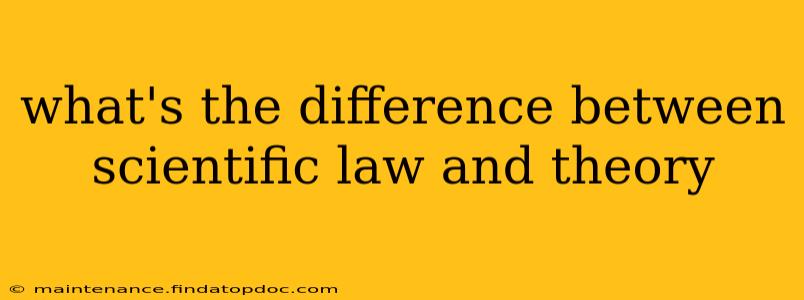What's the Difference Between Scientific Law and Theory?
The terms "scientific law" and "scientific theory" are often confused, leading to misunderstandings about how science works. The key difference lies not in their certainty or importance, but in what they describe. They represent different aspects of our understanding of the natural world.
Scientific Law: A scientific law describes what happens under certain conditions in the natural world. It's a concise statement, often a mathematical equation, that summarizes a large amount of experimental data. It describes an observed phenomenon without necessarily explaining why it happens. Think of it as a description of a pattern.
Examples of Scientific Laws:
- Newton's Law of Universal Gravitation: Describes the force of attraction between any two objects with mass. It doesn't explain why gravity exists, just how it behaves.
- Law of Conservation of Energy: States that energy cannot be created or destroyed, only transformed from one form to another. It describes the behavior of energy, not its fundamental nature.
- Boyle's Law: Describes the relationship between the pressure and volume of a gas at a constant temperature. It's a concise statement summarizing observed behavior.
Scientific Theory: A scientific theory explains why something happens. It's a well-substantiated explanation of some aspect of the natural world that can incorporate facts, laws, inferences, and tested hypotheses. It's a much broader and more complex concept than a law. A good theory makes testable predictions.
Examples of Scientific Theories:
- Theory of Evolution by Natural Selection: Explains how species change over time through mechanisms like natural selection, genetic drift, and mutation. It's not just a statement of fact; it's a comprehensive explanation involving various processes.
- Germ Theory of Disease: Explains that many diseases are caused by microorganisms. It provides a mechanism for understanding the cause and spread of illness.
- Big Bang Theory: A comprehensive explanation for the origin and evolution of the universe, encompassing various observations and supporting evidence.
Common Misconceptions & FAQs
H2: Are theories less certain than laws?
No. This is a major misconception. A scientific theory is not a guess or a hunch; it's a robust explanation supported by extensive evidence. In fact, theories are often more comprehensive and powerful than laws. Laws describe observations; theories explain them. The theory of gravity, for example, explains why Newton's Law of Universal Gravitation works.
H2: Can a theory become a law?
No. Theories and laws serve different purposes. A theory doesn't "graduate" to become a law. They are distinct ways of representing scientific knowledge. A law describes a relationship; a theory explains it.
H2: What if new evidence contradicts a theory?
Scientific theories are always subject to revision or refinement based on new evidence. This is a strength of the scientific process, not a weakness. If compelling evidence contradicts a theory, the theory will be modified or replaced with a better explanation.
In Summary:
Scientific laws describe observations; scientific theories explain them. Both are essential components of scientific understanding, and neither is inherently "better" than the other. They work together to provide a comprehensive picture of the natural world. The confusion arises from the everyday use of the words "law" and "theory," which differ significantly from their scientific meanings.
